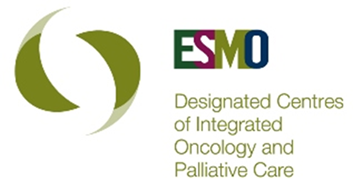Palliative Care
What is Palliative Care?
“Palliative care is an approach that improves the quality of life of patients and their families facing the problem associated with life-threatening illness, through the prevention and relief of suffering by means of early identification and impeccable assessment and treatment of pain and other problems, physical, psychosocial and spiritual” - World Health Organization

SunMed Supportive & Palliative Care Service
The SunMed Supportive & Palliative Care Service consists of a specialist-led team of doctors and nurses who have been professionally trained to care for palliative care patients. The service has been internationally recognised as a “Designated Centre of Integrated Oncology and Palliative Care” by the prestigious European Society for Medical Oncology (ESMO) from 2018-2021 and re-accredited for 2022-2024. It is also a member of the Asia Pacific Hospice Network (APHN) and is actively involved in education and scientific research, which had been published and featured in the acclaimed international medical journal of Palliative Medicine.*
*Ho JFV, Yaakup H, Low GSH, Wong SL, Tho LM, Tan SB. Morphine use for cancer pain: A strong analgesic used only at the end of life? A qualitative study on attitudes and perceptions of morphine in patients with advanced cancer and their caregivers. Palliat Med. 2020;34(5):619-629.
For cancer patients
Cancer can affect patients in a multitude of ways – biologically, physically and psychologically. Palliative care aims to improve quality of life by addressing the patients’ (and their families’) needs during this difficult time.
Individuals with cancer can have symptoms from the disease or side effects from the cancer treatments, such as pain, breathlessness, nausea, loss of appetite and fatigue. Most of these symptoms can be managed through careful assessment and an individualized and holistic plan of care from the palliative care team.
Palliative care can be provided alongside curative cancer treatments, and is not merely for individuals at the end of life. Often times, good management of symptoms enables the patients to continue with the necessary cancer treatments such as chemotherapy and radiotherapy, to ensure optimal management of their disease.
The early involvement of the palliative care team in the management of patients with advanced cancers has also been shown to improve quality of life, reduce depression, enhance coping and even improve survival.
Palliative care and hospice
In Malaysia, the terms palliative care and hospice care are synonymous, with the aims of relieving suffering and improving quality of life. Generally, hospice care refers to palliative care services in the community that is provided by NGOs such as hospices. There is defined duration of palliative or hospice services, and services would be offered as long as there is a continued need, based on the patient’s illness trajectory.
Common Myths About Palliative Care

Palliative Care is not limited to patients at the end-of-life. It involves providing comprehensive care to ensure optimal pain and symptom management, and adequate psychosocial and spiritual support for patients with advanced illness and their families throughout the course of their illness.
Palliative Care aims to help the patient & their family to maintain hope and can be beneficial when you are on active treatment to achieve better symptom management and quality of life.
Palliative Care not only improves the quality of care of the patient, but also supports their family in both psychosocial and emotional aspects, including discharge planning, caregiver education and bereavement care.
Palliative Care can help to support the patient and family caregivers to cope with care at home by optimizing their symptom control, facilitating the transition from hospital to home with our home palliative care service, and liaising with community hospice services.
Opioid medications like Morphine are safe and effective when used correctly, and is recommended as the first-line analgesia for moderate to severe cancer pain. It can also be used to relieve other symptoms like severe cough and breathlessness.
For further information, please contact our SunMed Supportive & Palliative Care Service :
Tel : +603-7491 9191 (ext : 16417 / 16411)
